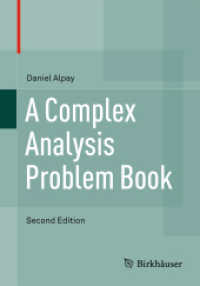- ホーム
- > 洋書
- > 英文書
- > History / World
Full Description
Reduced Price!
Now only € 10,00 instead of € 38,50
Laughter, often defined as humankind's exclusive characteristics, remains in itself an ambiguity. All the more so when one attempts to understand it in a culture from the past. Can humour be considered as a universal and ahistorical phenomenon? Or do we actually project our own tastes on our forebears? It may well be that one has not always laughed for the same reasons and at the same objects; indeed, some forms like parody and satire seem to thrive upon a variety of now outdated and even half forgotten codes and discourses. In the face of these questions, the Leuven Institute of Medieval Studies has attempted to address some of the multiple aspects of medieval laughter, its possible devices, functions and intentions by inviting a number of colleagues to give or write a paper with their own views on the subject. Surprisingly, although they are discussing a great many texts and genres, quite a few contributors appear to agree that the risus mediaevalis already often proceeds from a contrast, a shifting which in its turn produces an effect of surprise. Medieval humour, however, is not a simple thing and takes many forms: e.g. a comedy of corpses where in last resort, the joke is on death itself-, a wit of wordplay on the borderline of form and content, a ludic or perhaps carnivalesque happening, a burlesque confrontation between registers, a weapon aimed at a certain group, an ironic use or even a satire of conventions, a playful doodle referring to what happens not on the manuscript page but to the world outside. Questions are also being asked about who exactly was supposed to be amused by some of these jokes and to what effect. And what could have been the audience's response? Did its mirth create a common bond against the other, a release, a confirmation of norm? Or was it sometimes merely a way of enjoying one of the joys of life?
Contents
What about Medieval Humour? Some Historiography
Johan Verberckmoes
The Comedy of Corpses in Medieval Comic Tales
Derek Brewer
Laughing at the Language of Love: the Limits of Linguistic Representation in John Heywood's 'A Play of Love'
Amanda Piesse
Entre folie et raison: les drà'leries du ms. B.N. fr. 25526
Herman Braet
Quelques effects burlesques dans le 'Livre des Manières'
Jean Batany
La plaisanterie dans le 'Lai de Nabaret'
Rosanna Brusegan
Fabliau et satire cléricale: 'La spécificité de 'Frere Denise' par Rutebeuf
Jean Subrenat
Les 'us' des femmes et la 'clergie' dans 'Richeut'
Tony Hunt
Halfway to Quixote: Humour in 'Blandin de Cornoalha'
Norris J. Lacy
Of Wives and Men: Middle Dutch Fabliaux on a Hot Urban Issue
Fred Lodder
Viole(n)t-Stories: The Violet Story and its Adaptations in the Neidhart Plays
Katja Scheel
Footsteps in the Snow: A Latin Tale from Charlemagne to Justus Lipsius and Beyond
Gilbert Tournoy






